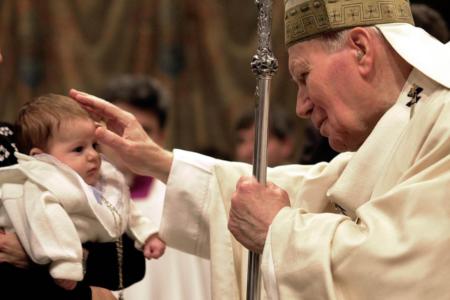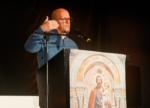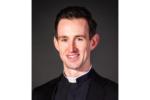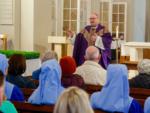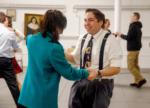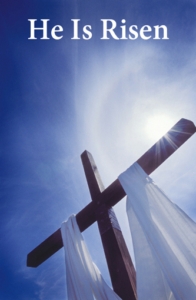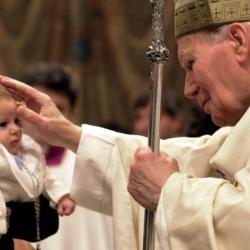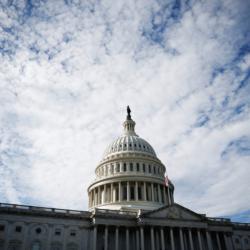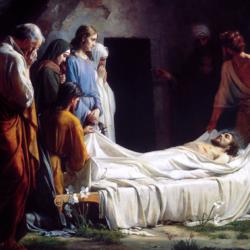The collects of Easter: The Sixth Sunday and the Ascension of the Lord
The Sixth Sunday
Grant, almighty God,
that we may celebrate with heartfelt devotion
these days of joy,
which we keep in honor of the risen Lord,
and that what we relive in remembrance
we may always hold to in what we do.
What do we do in the sacred liturgy? We participate. That's a word we have heard a lot of since the fathers of the Second Vatican Council published the ''Constitution the Sacred Liturgy,'' almost fifty years ago. Full, conscious, and active participation in the sacred liturgy, they wrote, is the right and responsibility of all the baptized and the goal which is to be considered before all others in the reform of the Church's sacred rites.
We participate. We participate by song, by gesture, by posture, by procession, by listening, by seeing, and even by smelling the incense! But what lies behind all this active participation? What are we really doing when we participate in the celebration of the Eucharist, the source and the summit of our lives?
There's a curious phrase near the end of today's collect that can help us to answer this question. At Mass, the prayer tells us, we relive in remembrance the sacrifice of Christ.
The word for it in Greek is anamnesis. In Latin, the word is memoria. Jesus says it at the Last Supper, after he has given us his Body and Blood as food and drink he says, do this in memory of me.
Such remembrance is something more than fond recollection. It's not the same thing that we do when looking through an old photo album from days gone by. Remembrance in the sacred liturgy; remembrance at Mass is a participation in the Paschal dying and rising of Christ, a reliving in remembrance of the saving event of our lives.
For when we celebrate the sacred mysteries we do not just call to mind the breaking of the bread in the upper room, we sit at that table and we hear Christ Jesus say to us "take this all of you and eat of it for this is my body." Thus the broken bread which we eat is his body and the chalice from which we drink holds his blood. When we celebrate the sacred mysteries we do not just call to mind that cross on Calvary Hill, but we stand with the Blessed Virgin and the beloved disciple and we are washed clean by the Blood of the Lamb who looks down upon us from the wood of the cross and says love others as I have loved you.
Each time, then, that we celebrate these mysteries with heartfelt devotion they change our lives. For once you have stood at the foot of the cross, you are never the same. Once you have eaten his body and drunk his blood, you are never the same. For the altar and the cross, one in the same, is the school of those who seek to be his disciples, those who seek to cling to him, ever living in remembrance the sacred mysteries of our faith.
The Ascension of the Lord
Gladden us with holy joys, almighty God,
and make us rejoice with devout thanksgiving,
for the Ascension of Christ your Son is our exaltation,
and, where the Head has gone before in glory,
the Body is called to follow in hope.
When we hear the collect for the feast of the Ascension of the Lord, we cannot help but stand with the Blessed Virgin Mary and the apostles on that hillside as they stared up into the eastern sky, already longing for the Lord who had ascended to the right hand of his father in heaven. They gaze with a longing already for his return in glory at the end of time.
But the collect for today's Mass, using a phrase from the prayers of Advent, begs God to gladden us, to fill us with holy joys, to make us rejoice as the Lord ascends to heaven.
Why would we rejoice when the Lord is leaving us? First, one might suppose, it is because of the assurance of the Lord that he would remain with us always until the end of time. Or perhaps, it is because of his promise of the Paraclete, the Holy Spirit, who will call upon us at Pentecost.
But the collect suggests an even deeper reason for our joy. This joy is rooted in devout thanksgiving that "where the Head has gone before in glory, the Body is called to follow in hope." Christ, of course, is the head of the Church. And now in his ascension into heaven he enters into glory. But he, the firstborn of many brothers, is only laying out the way that each of us should follow. For all who have died with the Lord, St. Paul assures us, will live with the Lord. And where he has gone, we too shall follow.
Which is why we live in hope. That's the meaning of the prayer the priest prays during the Lord's Prayer just before we receive Holy Communion:
''Deliver us, Lord, we pray, from every evil, graciously grant peace in our days,
that, by the help of your mercy, we may be always free from sin and safe from all distress, as we await the blessed hope and the coming of our Savior, Jesus Christ.''
''Expectantes in beatam spem....'' This is the joyful hope of the Blessed Virgin and the apostles on that first Ascension morning, it is the hope of the Church as she awaits the return of her Savior in glory and it is our hope, our joyful hope, as we await the coming of our Lord Jesus Christ.
Msgr. James P. Moroney, presently professor of liturgy at St. John's Seminary, Brighton becomes the 20th rector there on July 1, 2012. This is the sixth of a series of reflections on the collects of the Easter season.
